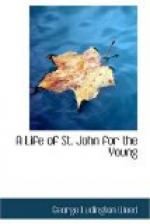The names of the other pair of brothers were James and John. Their father was named Zebedee. He also was a fisherman having so much prosperity in his business that he employed servants to help him. Judging by what we know of the family they must have been highly respected by the people among whom they lived.
We do not know the exact date of John’s birth. He was probably younger than James, and several years younger than Peter.
The mother of James and John was named Salome. We know more of her than of her husband. She was a warm friend of Jesus, ministering to Him when He was living, and was one of the few who cared for His dead body. Her sons seemed to be greatly attached to her. All were of kindred spirit, having like thoughts, feelings and plans.
James and John were brothers indeed, companions until the death of James separated them. The feelings of boyhood must have been greatly strengthened in later scenes, and by influences which we shall have occasion to notice. As we know of them as daily companions in manhood, we think of the intimacy and affection of boyhood. It will help us to gain an idea of their companionship, and the influences of their surroundings, if we notice some things with which they were familiar in the region of their home.
Standing on one of the hills behind Bethsaida they beheld a magnificent panorama. In the northeast Hermon rose like a mighty giant, called by the people of the land the “Kingly Mountain.” They knew it by the name Moses had given it—“the goodly mountain.” They were to know it by the name which Peter would give in after years, “The Holy Mount,” so called for a blessed reason of which all of them were to learn. Down from its snowy glittering sides a thousand streamlets blended in larger streams combining in the Jordan, which flowed through marshes and Lake Merom until it entered Gennesaret near their home. Eastward, across the lake, the rugged cliffs of Gadara cut off their view. Perhaps at this very hour the winds from Hermon rushed through the gorges, first ruffling the placid waters of the lake, and then tossing them as if in rage. They little thought of a coming time when they themselves would be tossed upon them until they heard a voice saying, “Peace be still.” And now
“The warring winds have
died away,
The clouds, beneath
the glancing ray,
Melt off, and leave
the land and sea
Sleeping in bright tranquillity.
Below, the
lake’s still face
Sleeps sweetly
in th’ embrace
Of mountains terraced
high with mossy stone.”
[Illustration: CALM ON GALILEE From Photograph Page 26]
In another hour they watch the more quiet movements of pleasure boats,—gay barges and royal galleys—and trading vessels, and fishing boats,—all crowding together seemingly covering the lake.
As it narrows in the southern distance, the Jordan commences the second stage of its journey of one hundred and twenty miles through rugged gorges. As it leaves the quiet lake, we can almost hear them saying to it




